Philip Roth! Stephen King! Zadie Smith! Jonathan Lethem! Outrageous opinions and real-life resurrections! Fasten your spectacles—you're in for some wild reads.
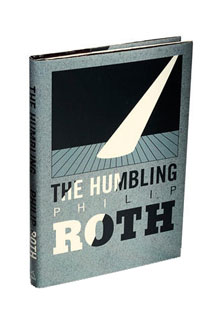 The Humbling
The HumblingBy Philip Roth
160 pages; Houghton Mifflin Harcourt
Philip the great, Philip the audacious, the voracious, writes of bottomless hunger—emotional, sexual, existential. When you hear about a new Philip Roth novel, you have to read it, even (especially!) knowing you'll feel like you've walked into a small room with a self-consuming predator. The Humbling takes you into the constricted world of Simon Axler, an iconic, aging actor who, having lost his "magic" ("He could not give and he could not withhold"), is flirting with suicide, only to revive after sexually adventurous sometime-lesbian Pegeen Mike, daughter of Simon's old friends, knocks on his door. Love bites (natch), but Roth still has his chops.
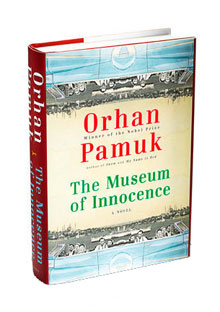
Photo: Ben Goldstein/Studio D
By Orhan Pamuk
560 pages; Knopf
In The Museum of Innocence, Nobel Prize–winning Turkish novelist Orhan Pamuk offers a world-class lesson in heartbreak and happiness. Kemal, Pamuk's narrator, is the thwarted lover, his beloved the exquisite Füsun, who marries another man. Her rosewater-scented hands have touched the ordinary objects (a barrette, a glass, a cigarette) that Kemal has furtively taken and now displays in his intimate museum—which is both the house in Istanbul where Füsun once lived, and the book that tells her story. Pamuk's own presence in this wily narrative is as surreptitious as passion itself.
560 pages; Knopf
In The Museum of Innocence, Nobel Prize–winning Turkish novelist Orhan Pamuk offers a world-class lesson in heartbreak and happiness. Kemal, Pamuk's narrator, is the thwarted lover, his beloved the exquisite Füsun, who marries another man. Her rosewater-scented hands have touched the ordinary objects (a barrette, a glass, a cigarette) that Kemal has furtively taken and now displays in his intimate museum—which is both the house in Istanbul where Füsun once lived, and the book that tells her story. Pamuk's own presence in this wily narrative is as surreptitious as passion itself.
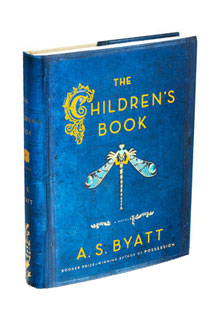
Photo: Ben Goldstein/Studio D
By A.S. Byatt
688 pages; Knopf
If you buried A.S. Byatt's The Children's Book under a few inches of leafy mulch, it might begin to sprout—that's how alive it is, how potent its English genes. David Copperfield, Prospero, Jane Eyre, and others haunt this novel, poised on the cusp of the 20th century, in which a raggedy, talented kiln worker's son crosses class boundaries to practice the subtle craft of pottery; a lovely matriarch writes dark fairy tales in an old country house; children waste away from toxic family secrets; and ambitious women strain against suffocating tradition. Byatt is a master storyteller, but even more spellbinding than this novel's descriptions of nature and the supernatural is its intensely personal narrative of the Great War, where dreams of justice and mercy die hard.
688 pages; Knopf
If you buried A.S. Byatt's The Children's Book under a few inches of leafy mulch, it might begin to sprout—that's how alive it is, how potent its English genes. David Copperfield, Prospero, Jane Eyre, and others haunt this novel, poised on the cusp of the 20th century, in which a raggedy, talented kiln worker's son crosses class boundaries to practice the subtle craft of pottery; a lovely matriarch writes dark fairy tales in an old country house; children waste away from toxic family secrets; and ambitious women strain against suffocating tradition. Byatt is a master storyteller, but even more spellbinding than this novel's descriptions of nature and the supernatural is its intensely personal narrative of the Great War, where dreams of justice and mercy die hard.
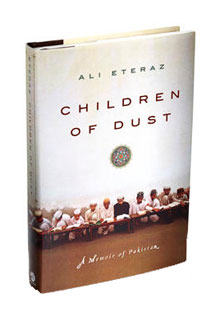
Photo: Ben Goldstein/Studio D
By Ali Eteraz
352 pages; HarperOne
To a boy growing up in Pakistan, prayers were a taste of paradise, proof against Soviet invaders and demons of a less substantial kind. The world was awash with spirits, and calls to heroic virtue were irresistible. Ali Eteraz's memoir, Children of Dust, describes this ardent young Muslim's picaresque journey from a brutal Pakistani madrassa (oddly reminiscent of a British boys' school) to America's Bible Belt ("Allahbama," in his devout but increasingly modern eyes), where he braved the sexual fantasyland of AOL and zealously warded off temptation in miniskirts. Though Eteraz's dreams of glory would eventually take a mundane turn ("I wanted Wolf Blitzer to do a story about me"), his adventures are a heavenly read.
352 pages; HarperOne
To a boy growing up in Pakistan, prayers were a taste of paradise, proof against Soviet invaders and demons of a less substantial kind. The world was awash with spirits, and calls to heroic virtue were irresistible. Ali Eteraz's memoir, Children of Dust, describes this ardent young Muslim's picaresque journey from a brutal Pakistani madrassa (oddly reminiscent of a British boys' school) to America's Bible Belt ("Allahbama," in his devout but increasingly modern eyes), where he braved the sexual fantasyland of AOL and zealously warded off temptation in miniskirts. Though Eteraz's dreams of glory would eventually take a mundane turn ("I wanted Wolf Blitzer to do a story about me"), his adventures are a heavenly read.

Photo: Ben Goldstein/Studio D
By Abby Sher
320 pages; Scribner
Abby Sher knew she wasn't an innocent child: She was a monster whose malevolent imaginings could kill. Even before the death of the father she idolized ("one huge and ugly disappearing trick"), she tried to foil disaster through list-making, counting, compulsively tracing the wallpaper in her room. Later on she cut, starved, and purged herself while insistently, repetitively praying her destructiveness would turn inward. "I had never believed in a vengeful G-d," she writes in Amen, Amen, Amen . "I believed in a vengeful me." A story of obsessive-compulsive terrors that Sher (who also does improvisational comedy) plays for laughs as well as tears.
Get the free reading group guide for this book!
320 pages; Scribner
Abby Sher knew she wasn't an innocent child: She was a monster whose malevolent imaginings could kill. Even before the death of the father she idolized ("one huge and ugly disappearing trick"), she tried to foil disaster through list-making, counting, compulsively tracing the wallpaper in her room. Later on she cut, starved, and purged herself while insistently, repetitively praying her destructiveness would turn inward. "I had never believed in a vengeful G-d," she writes in Amen, Amen, Amen . "I believed in a vengeful me." A story of obsessive-compulsive terrors that Sher (who also does improvisational comedy) plays for laughs as well as tears.
Get the free reading group guide for this book!
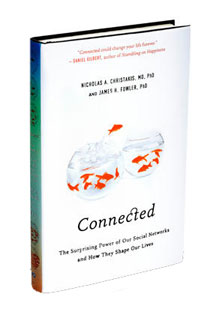
Photo: Ben Goldstein/Studio D
By Nicholas A. Christakis, MD, PhD
352 pages; Little, Brown
A neighbor's loneliness can make you lonelier. Love at first sight is no accident. Obesity is contagious. "You make me sick" may be a statement of fact. Connected, by Nicholas A. Christakis, MD, PhD, and James H. Fowler, PhD, explores the startling intricacy of social networks—how they're formed, how they influence economic, political, and other behaviors. "Only connect" was E.M. Forster's survival strategy. To which this duo of scientists might answer, As if you had a choice!
352 pages; Little, Brown
A neighbor's loneliness can make you lonelier. Love at first sight is no accident. Obesity is contagious. "You make me sick" may be a statement of fact. Connected, by Nicholas A. Christakis, MD, PhD, and James H. Fowler, PhD, explores the startling intricacy of social networks—how they're formed, how they influence economic, political, and other behaviors. "Only connect" was E.M. Forster's survival strategy. To which this duo of scientists might answer, As if you had a choice!
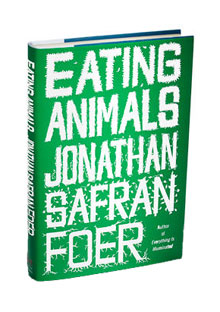
Photo: Ben Goldstein/Studio D
By Jonathan Safran Foer
341 pages; Little, Brown
No one has ever accused Jonathan Safran Foer (Extremely Loud and Incredibly Close) of being timid. But for a hot young writer to train his sights on a subject as unpalatable as meat production and consumption takes raw nerve. What makes Eating Animals so unusual is vegetarian Foer's empathy for human meat eaters, his willingness to let both factory farmers and food reform activists speak for themselves, and his talent for using humor to sweeten a sour argument.
341 pages; Little, Brown
No one has ever accused Jonathan Safran Foer (Extremely Loud and Incredibly Close) of being timid. But for a hot young writer to train his sights on a subject as unpalatable as meat production and consumption takes raw nerve. What makes Eating Animals so unusual is vegetarian Foer's empathy for human meat eaters, his willingness to let both factory farmers and food reform activists speak for themselves, and his talent for using humor to sweeten a sour argument.
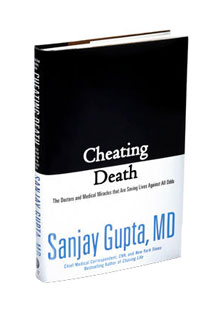
Photo: Ben Goldstein/Studio D
By Sanjay Gupta, MD
304 pages; Grand Central
"Let me let you in on a little secret: When the heart stops beating, it's not the end." If you can read that sentence and not devour the rest of Cheating Death, by neurosurgeon Sanjay Gupta, you're probably not breathing. Gupta tells of death-defying treatments like therapeutic hypothermia, often as simple as wrapping a patient in sheets dipped in ice water—not standard practice in the United States, because commonsense solutions are harder to sell than pricey wonder pills. Behind Gupta's stories of ways to jump-start life—including a radical revisiting of CPR—is his conviction that dying may be natural, but it's also natural to resist it with all your might.
304 pages; Grand Central
"Let me let you in on a little secret: When the heart stops beating, it's not the end." If you can read that sentence and not devour the rest of Cheating Death, by neurosurgeon Sanjay Gupta, you're probably not breathing. Gupta tells of death-defying treatments like therapeutic hypothermia, often as simple as wrapping a patient in sheets dipped in ice water—not standard practice in the United States, because commonsense solutions are harder to sell than pricey wonder pills. Behind Gupta's stories of ways to jump-start life—including a radical revisiting of CPR—is his conviction that dying may be natural, but it's also natural to resist it with all your might.
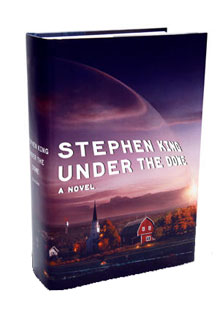
Photo: Ben Goldstein/Studio D
By Stephen King
1,072 pages; Scribner
As if life in small-town America weren't tough enough, an invisible, impermeable (literally bombproof) sky-high dome suddenly descends on quiet Chester's Mill, Maine. No one can get out or in, and vermin—of the human variety—soon wreak more havoc than whoever (or whatever) has dropped this nightmare on the unsuspecting burg. Trust Stephen King to create more hellish scenarios, in the 1,072 pages of Under the Dome, than you could ever imagine, yet still have you wanting more.
1,072 pages; Scribner
As if life in small-town America weren't tough enough, an invisible, impermeable (literally bombproof) sky-high dome suddenly descends on quiet Chester's Mill, Maine. No one can get out or in, and vermin—of the human variety—soon wreak more havoc than whoever (or whatever) has dropped this nightmare on the unsuspecting burg. Trust Stephen King to create more hellish scenarios, in the 1,072 pages of Under the Dome, than you could ever imagine, yet still have you wanting more.
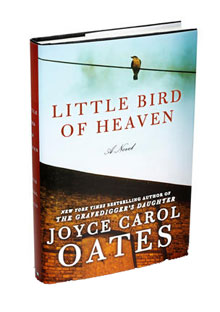
Photo: Ben Goldstein/Studio D
By Joyce Carol Oates
448 pages; Ecco
Joyce Carol Oates's fiction is often suffused with a kind of bleak romanticism, not least in her latest, Little Bird of Heaven. The walking wounded include love-starved adolescent Krista Diehl, her adored and volatile father, Eddy, and furious Aaron Kruller, son of the gently seductive young woman Eddy may have murdered. Coursing through these pages is the Black River in upstate Sparta, New York, a darkly realistic pathway for lethal dreams.
448 pages; Ecco
Joyce Carol Oates's fiction is often suffused with a kind of bleak romanticism, not least in her latest, Little Bird of Heaven. The walking wounded include love-starved adolescent Krista Diehl, her adored and volatile father, Eddy, and furious Aaron Kruller, son of the gently seductive young woman Eddy may have murdered. Coursing through these pages is the Black River in upstate Sparta, New York, a darkly realistic pathway for lethal dreams.
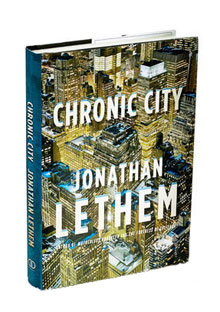
Photo: Ben Goldstein/Studio D
By Jonathan Lethem
480 pages; Doubleday
"There's something pleasant about me," muses retired actor Chase Insteadman in Jonathan Lethem's Chronic City . "I skate on frictionless ball bearings of charm…charisma that threatens no one." Ah, but friction, charisma, unpleasantness, and threat are key to this tale of scintillating misfits (polemical, sardonic Perkus Tooth), power brokers (Richard Abneg, a billionaire mayor's operative), nervy, vulnerable heroines (Chase's lost-in-space astronaut fiancée, Janice Trumbull, and ghostwriter Oona Laszlo, "a rib of Manhattan torn out to make a woman"). All careen through Lethem's dizzyingly brilliant urban enigma, in which love is elusive and intimations of apocalypse (e.g., a mammoth infrastructure-crunching tiger) are as common as cheeseburgers.
Get the free reading group guide for this book!
480 pages; Doubleday
"There's something pleasant about me," muses retired actor Chase Insteadman in Jonathan Lethem's Chronic City . "I skate on frictionless ball bearings of charm…charisma that threatens no one." Ah, but friction, charisma, unpleasantness, and threat are key to this tale of scintillating misfits (polemical, sardonic Perkus Tooth), power brokers (Richard Abneg, a billionaire mayor's operative), nervy, vulnerable heroines (Chase's lost-in-space astronaut fiancée, Janice Trumbull, and ghostwriter Oona Laszlo, "a rib of Manhattan torn out to make a woman"). All careen through Lethem's dizzyingly brilliant urban enigma, in which love is elusive and intimations of apocalypse (e.g., a mammoth infrastructure-crunching tiger) are as common as cheeseburgers.
Get the free reading group guide for this book!
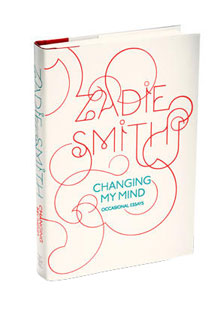
Photo: Ben Goldstein/Studio D
By Zadie Smith
320 pages; Penguin
Best known for her multifaceted fiction, Zadie Smith now has her first collection of essays, Changing My Mind, warmly insightful pieces that tease apart knotty strands of human experience. She writes about racial and ethnic identity (or, in her own case, multiple identities), about how writers read one another. She has an uncanny eye for detail, on the streets of Liberia or at an Oscar gala in Los Angeles. Among this book's diverse pleasures, a stunningly precise anatomy of Greta Garbo: "You don't put the sphinx in a swimsuit.… She would be myth or nothing at all."
320 pages; Penguin
Best known for her multifaceted fiction, Zadie Smith now has her first collection of essays, Changing My Mind, warmly insightful pieces that tease apart knotty strands of human experience. She writes about racial and ethnic identity (or, in her own case, multiple identities), about how writers read one another. She has an uncanny eye for detail, on the streets of Liberia or at an Oscar gala in Los Angeles. Among this book's diverse pleasures, a stunningly precise anatomy of Greta Garbo: "You don't put the sphinx in a swimsuit.… She would be myth or nothing at all."
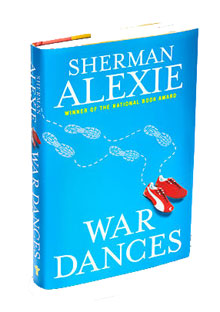
Photo: Ben Goldstein/Studio D
By Sherman Alexie
256 pages; Grove
Sherman Alexie is not a finicky writer. He is often messy and in-your-face in a way that can make you laugh (or shudder) when you least expect to—as when one story's narrator, a Spokane Indian, constructs an exit interview after his father's death ("Your oldest son and your two daughters, all over 36 years of age, still live in your house. Do you think this is a lovely expression of tribal culture? Or is it a symptom of extreme familial codependence?"). War Dances is Alexie's fiercely freewheeling collection of stories and poems about the tragicomedies of ordinary lives.
256 pages; Grove
Sherman Alexie is not a finicky writer. He is often messy and in-your-face in a way that can make you laugh (or shudder) when you least expect to—as when one story's narrator, a Spokane Indian, constructs an exit interview after his father's death ("Your oldest son and your two daughters, all over 36 years of age, still live in your house. Do you think this is a lovely expression of tribal culture? Or is it a symptom of extreme familial codependence?"). War Dances is Alexie's fiercely freewheeling collection of stories and poems about the tragicomedies of ordinary lives.
Photo: Ben Goldstein/Studio D




